状语从句的翻译.
- 格式:ppt
- 大小:1.75 MB
- 文档页数:89
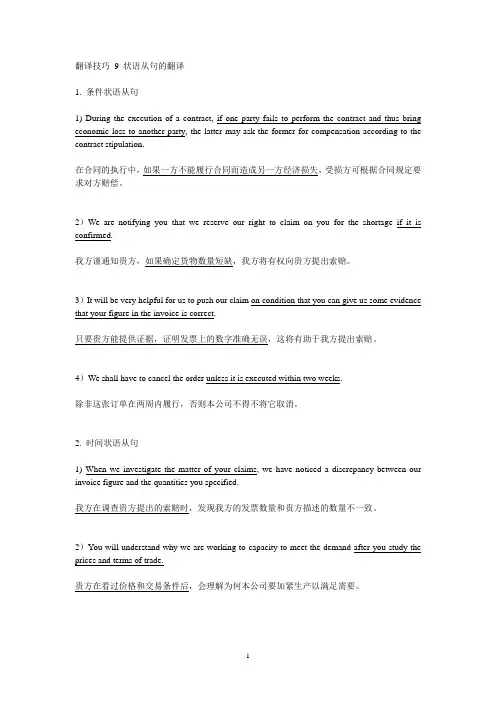
翻译技巧9 状语从句的翻译1. 条件状语从句1) During the execution of a contract, if one party fails to perform the contract and thus bring economic loss to another party, the latter may ask the former for compensation according to the contract stipulation.在合同的执行中,如果一方不能履行合同而造成另一方经济损失,受损方可根据合同规定要求对方赔偿。
2)We are notifying you that we reserve our right to claim on you for the shortage if it is confirmed.我方谨通知贵方,如果确定货物数量短缺,我方将有权向贵方提出索赔。
3)It will be very helpful for us to push our claim on condition that you can give us some evidence that your figure in the invoice is correct.只要贵方能提供证据,证明发票上的数字准确无误,这将有助于我方提出索赔。
4)We shall have to cancel the order unless it is executed within two weeks.除非这张订单在两周内履行,否则本公司不得不将它取消。
2. 时间状语从句1) When we investigate the matter of your claims, we have noticed a discrepancy between our invoice figure and the quantities you specified.我方在调查贵方提出的索赔时,发现我方的发票数量和贵方描述的数量不一致。
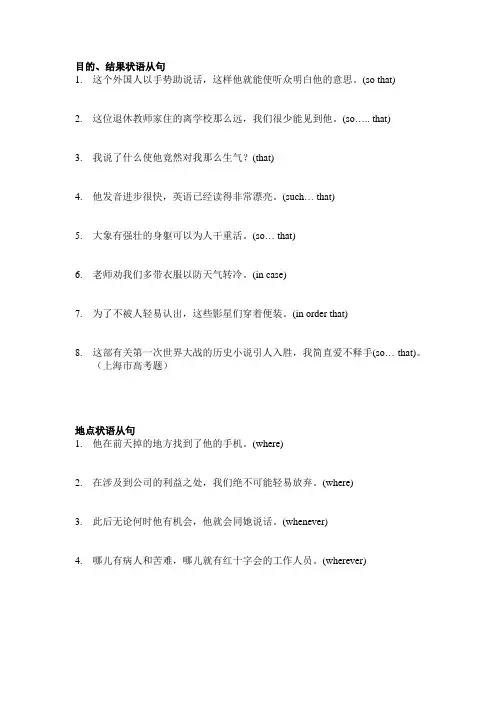
目的、结果状语从句1.这个外国人以手势助说话,这样他就能使听众明白他的意思。
(so that)2.这位退休教师家住的离学校那么远,我们很少能见到他。
(so….. that)3.我说了什么使他竟然对我那么生气?(that)4.他发音进步很快,英语已经读得非常漂亮。
(such… that)5.大象有强壮的身躯可以为人干重活。
(so… that)6.老师劝我们多带衣服以防天气转冷。
(in case)7.为了不被人轻易认出,这些影星们穿着便装。
(in order that)8.这部有关第一次世界大战的历史小说引人入胜,我简直爱不释手(so… that)。
(上海市高考题)地点状语从句1.他在前天掉的地方找到了他的手机。
(where)2.在涉及到公司的利益之处,我们绝不可能轻易放弃。
(where)3.此后无论何时他有机会,他就会同她说话。
(whenever)4.哪儿有病人和苦难,哪儿就有红十字会的工作人员。
(wherever)让步状语从句1.尽管我承认问题很难,我不同意说它们不能解决。
(while)2.无论我给他们多少忠告,他还是一意孤行。
(no matter how)3.即使我们旅行后很累了,我们仍情绪高昂。
(Even if)4.尽管他喜欢布朗教授的讲课,但不喜欢他的举止。
(though)5.无论你有可能说什么,我都会毫不犹豫地帮助她克服困难。
(whatever)6.这个工人无论怎样努力,他似乎总是不能把工作做得令人满意。
(however)7.不论你是冬天来还是夏天来,你都会觉得这是个居住的好地方。
(whether…or…)8.不管我何时打电话请求帮助,他都会马上来我家。
(whenever)9.今晚无论是谁来串门,告诉他我不到十点钟是不会回来的。
(whoever)10.虽然并不富裕,但是他对自己的生活相当满意。
(Although)(上海市高考题)。
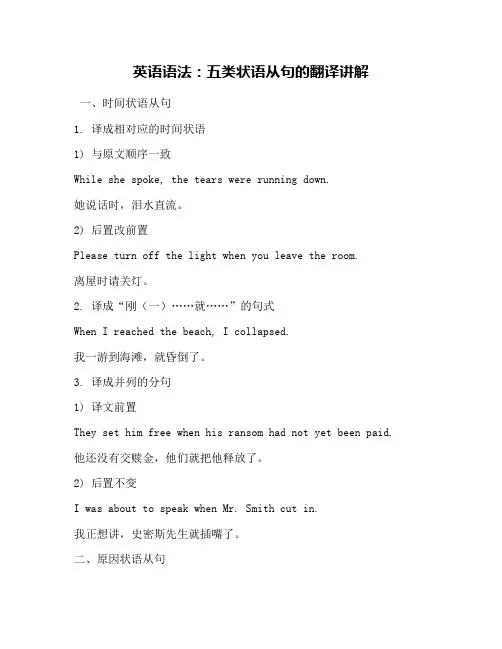
英语语法:五类状语从句的翻译讲解一、时间状语从句1. 译成相对应的时间状语1) 与原文顺序一致While she spoke, the tears were running down.她说话时,泪水直流。
2) 后置改前置Please turn off the light when you leave the room.离屋时请关灯。
2. 译成“刚(一)……就……”的句式When I reached the beach, I collapsed.我一游到海滩,就昏倒了。
3. 译成并列的分句1) 译文前置They set him free when his ransom had not yet been paid.他还没有交赎金,他们就把他释放了。
2) 后置不变I was about to speak when Mr. Smith cut in.我正想讲,史密斯先生就插嘴了。
二、原因状语从句1. 译成表“因”的分句1) “因”在“果”之前The crops failed because the season was dry.因为气候干旱,作物歉收。
2) “果”在“因”之前She could get away with anything, because she looked such a baby.她能渡过任何风险,因为她看上去简直还像娃娃模样。
2. 译成因果偏正复句中的主句Pure iron is not used in industry because it is too soft.纯铁太软,所以不用在工业上。
Because he was convinced of the accuracy of this fact, he stuck to his opinion.他深信这件事准确可靠,所以坚持己见。
3. 译成无关联词的因果关系并列分句Where there is sound, there must be sound waves.哪里有声音,哪里就必有声波。
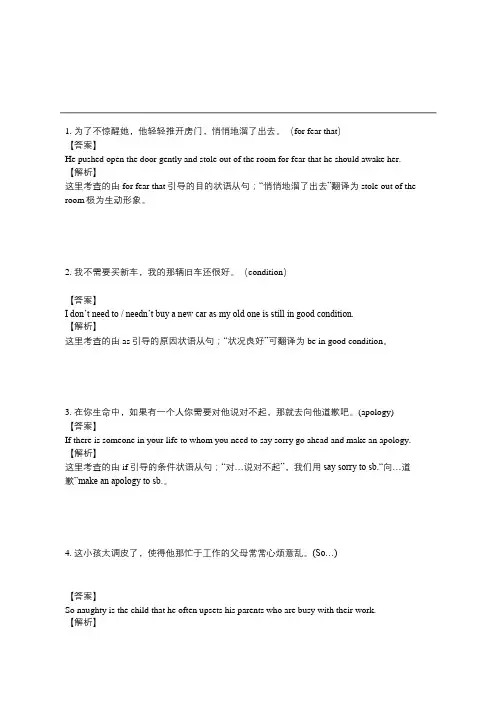
1. 为了不惊醒她,他轻轻推开房门,悄悄地溜了出去。
(for fear that)【答案】He pushed open the door gently and stole out of the room for fear that he should awake her.【解析】这里考查的由for fear that引导的目的状语从句;“悄悄地溜了出去”翻译为stole out of the room极为生动形象。
2. 我不需要买新车,我的那辆旧车还很好。
(condition)【答案】I don’t need to / needn’t buy a new car as my old one is still in good condition.【解析】这里考查的由as引导的原因状语从句;“状况良好”可翻译为be in good condition。
3. 在你生命中,如果有一个人你需要对他说对不起,那就去向他道歉吧。
(apology)【答案】If there is someone in your life to whom you need to say sorry go ahead and make an apology.【解析】这里考查的由if引导的条件状语从句;“对…说对不起”,我们用say sorry to sb.“向…道歉”make an apology to sb.。
4. 这小孩太调皮了,使得他那忙于工作的父母常常心烦意乱。
(So…)【答案】So naughty is the child that he often upsets his parents who are busy with their work.【解析】这里考查的是so…that引导的结果状语从句,千万要注意,so位于句首要用不完全倒装形式。
5. 自从出国留学后,她就不再和我们保持联系了。
(No longer)【答案】No longer has she kept in touch with us since she went abroad for further study / education.【解析】这里考查的是since引导的时间状语从句;与……保持联系keep in touch with;注意no longer位于句首,主句要使用部分倒装结构。
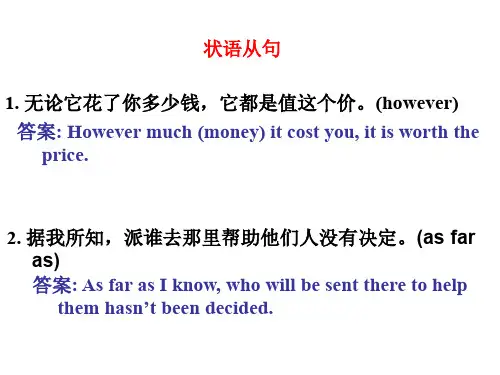
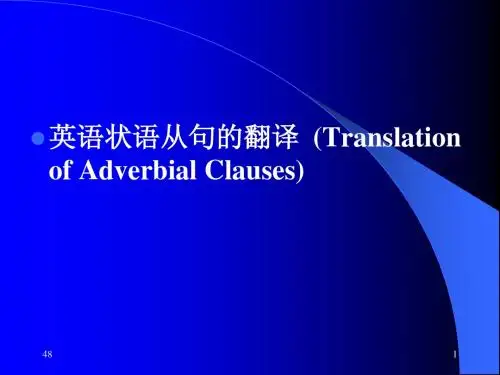

1.We would like your attention for three minutes while we explain the safety guidefor this flight.时间状从请大家用三分钟时间注意听讲,在我们解释这次航班的安全指南时。
*请大家用三分钟注意听讲一下这次航班的安全指南。
2.While we are serving meals, please move your seat back to its right place forsafety of the passenger behind you. 时间状从供应餐饮期间,为了你身后乘客的安全请大家将座椅移回原位。
3.If you need any help, please let us know by switching on the button next to thelight above your head. 条件状从如需帮助,请按你头顶上方靠灯的按钮让我们知道。
4.One of the most exciting moments will be in May when the Olympic flame istaken to the highest peak(山峰)in the world--Monut Qomolangma. 时间状从最令人兴奋的时刻之一将在五月,那时奥运火炬将被带到世界之巅--珠穆朗玛峰。
5.Ella and Hebe entered simply for the 10,000 yuan prize, while Selina wasencouraged by her young sister, who was then too young to take part. 转折对比,非限定性定从E和H的参赛只是奔着10000元的奖金而来的,而S的参赛却是受到了妹妹的鼓动,她妹妹那是还小,不能参赛。
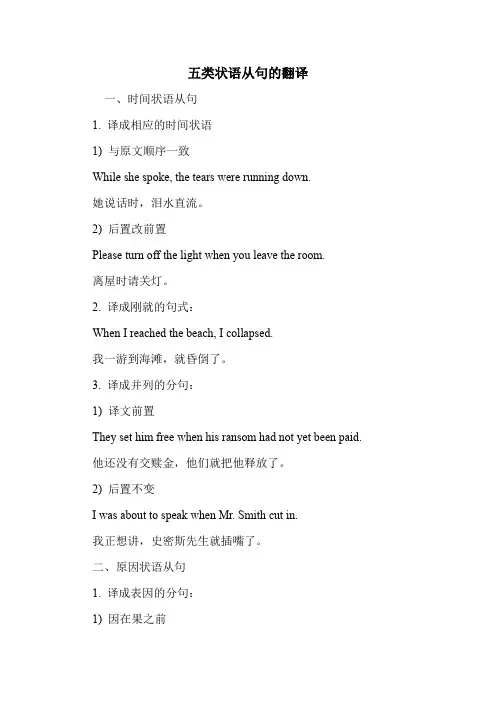
五类状语从句的翻译一、时间状语从句1. 译成相应的时间状语1) 与原文顺序一致While she spoke, the tears were running down.她说话时,泪水直流。
2) 后置改前置Please turn off the light when you leave the room.离屋时请关灯。
2. 译成刚就的句式:When I reached the beach, I collapsed.我一游到海滩,就昏倒了。
3. 译成并列的分句:1) 译文前置They set him free when his ransom had not yet been paid. 他还没有交赎金,他们就把他释放了。
2) 后置不变I was about to speak when Mr. Smith cut in.我正想讲,史密斯先生就插嘴了。
二、原因状语从句1. 译成表因的分句:1) 因在果之前The crops failed because the season was dry.因为气候干旱,作物歉收。
2) 果在因之前She could get away with anything, because she looked such a baby.她能渡过任何风险,因为她看上去简直还像娃娃模样。
2. 译成因果偏正复句中的主句:Pure iron is not used in industry because it is too soft.纯铁太软,所以不用在工业上。
Because he was convinced of the accuracy of this fact, he stuck to his opinion.他深信这件事正确可靠,因此坚持己见。
3. 译成无关联词的因果关系并列分句:Where there is sound, there must be sound waves.哪里有声音,哪里就必有声波。
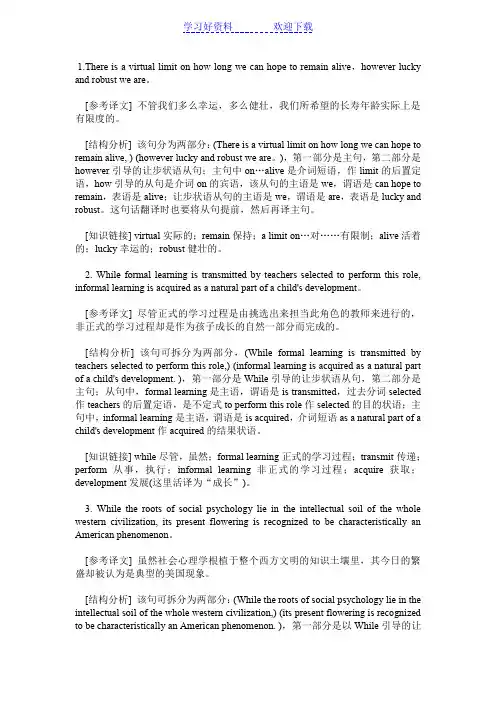
1.There is a virtual limit on how long we can hope to remain alive,however lucky and robust we are。
[参考译文] 不管我们多么幸运,多么健壮,我们所希望的长寿年龄实际上是有限度的。
[结构分析] 该句分为两部分:(There is a virtual limit on how long we can hope to remain alive, ) (however lucky and robust we are。
),第一部分是主句,第二部分是however引导的让步状语从句;主句中on…alive是介词短语,作limit的后置定语,how引导的从句是介词on的宾语,该从句的主语是we,谓语是can hope to remain,表语是alive;让步状语从句的主语是we,谓语是are,表语是lucky and robust。
这句话翻译时也要将从句提前,然后再译主句。
[知识链接] virtual实际的;remain保持;a limit on…对……有限制;alive活着的;lucky幸运的;robust健壮的。
2. While formal learning is transmitted by teachers selected to perform this role, informal learning is acquired as a natural part of a child's development。
[参考译文] 尽管正式的学习过程是由挑选出来担当此角色的教师来进行的,非正式的学习过程却是作为孩子成长的自然一部分而完成的。
[结构分析] 该句可拆分为两部分,(While formal learning is transmitted by teachers selected to perform this role,) (informal learning is acquired as a natural part of a child's development. ),第一部分是While引导的让步状语从句,第二部分是主句;从句中,formal learning是主语,谓语是is transmitted,过去分词selected 作teachers的后置定语,是不定式to perform this role作selected的目的状语;主句中,informal learning是主语,谓语是is acquired,介词短语as a natural part of a child's development作acquired的结果状语。
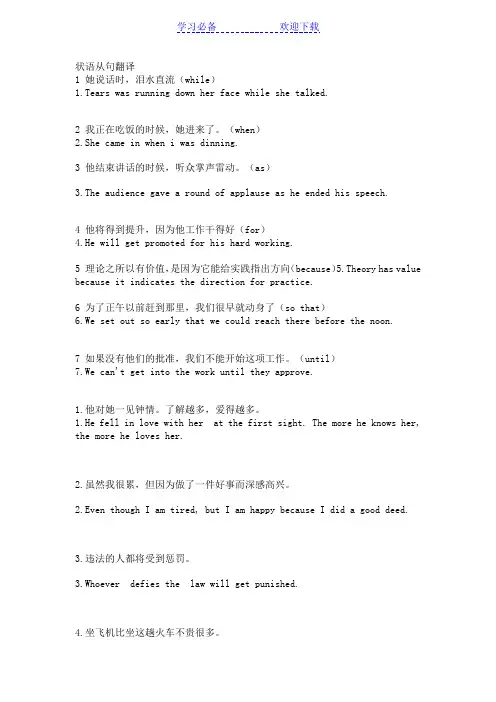
状语从句翻译1 她说话时,泪水直流(while)1.Tears was running down her face while she talked.2 我正在吃饭的时候,她进来了。
(when)2.She came in when i was dinning.3 他结束讲话的时候,听众掌声雷动。
(as)3.The audience gave a round of applause as he ended his speech.4 他将得到提升,因为他工作干得好(for)4.He will get promoted for his hard working.5 理论之所以有价值,是因为它能给实践指出方向(because)5.Theory has value because it indicates the direction for practice.6 为了正午以前赶到那里,我们很早就动身了(so that)6.We set out so early that we could reach there before the noon.7 如果没有他们的批准,我们不能开始这项工作。
(until)7.We can't get into the work until they approve.1.他对她一见钟情。
了解越多,爱得越多。
1.He fell in love with her at the first sight. The more he knows her, the more he loves her.2.虽然我很累,但因为做了一件好事而深感高兴。
2.Even though I am tired, but I am happy because I did a good deed.3.违法的人都将受到惩罚。
3.Whoever defies the law will get punished.4.坐飞机比坐这趟火车不贵很多。
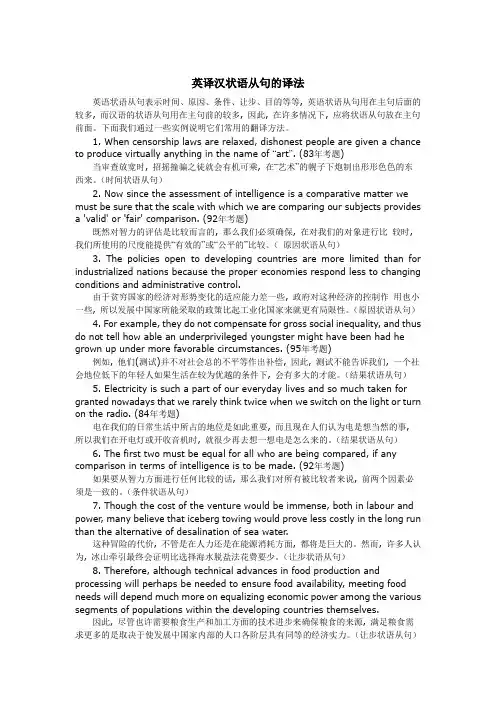
英译汉状语从句的译法英语状语从句表示时间、原因、条件、让步、目的等等, 英语状语从句用在主句后面的较多, 而汉语的状语从句用在主句前的较多, 因此, 在许多情况下, 应将状语从句放在主句前面。
下面我们通过一些实例说明它们常用的翻译方法。
1. When censorship laws are relaxed, dishonest people are given a chance to produce virtually anything in the name of “art”. (83年考题)当审查放宽时, 招摇撞骗之徒就会有机可乘, 在“艺术”的幌子下炮制出形形色色的东西来。
(时间状语从句)2. Now since the assessment of intelligence is a comparative matter we must be sure that the scale with which we are comparing our subjects provides a 'valid' or 'fair' comparison. (92年考题)既然对智力的评估是比较而言的, 那么我们必须确保, 在对我们的对象进行比较时, 我们所使用的尺度能提供“有效的”或“公平的”比较。
(原因状语从句)3. The policies open to developing countries are more limited than for industrialized nations because the proper economies respond less to changing conditions and administrative control.由于贫穷国家的经济对形势变化的适应能力差一些, 政府对这种经济的控制作用也小一些, 所以发展中国家所能采取的政策比起工业化国家来就更有局限性。
状语从句的翻译英语中的状语从句种类繁多,用法复杂,可以用来表示时间、地点、条件、目的、结果、原因、让步、方式、比较等意义。
由于英汉两种语言在表达习惯上的不同,在状语从句的安排上存在着明显的差异。
英语中的状语从句多用在主句后面,而汉语中则习惯于将状语从句放在主句之前,因此在翻译成汉语时一般将状语从句置于主句前面。
当然,对于不同的状语从句,在翻译时也需要根据汉语习惯来灵活翻译。
下面将具体介绍各种状语从句的翻译方法。
一、时间状语从句在英语中,时间状语从句的连接词有:when(当??的时候),whenever(每当??),as(当??时), since(自从??),until(直到??,如果不??),till(直到??),before(在??前),after(在??后),as soon as(一??就??),once(一旦??),the moment(一??就??),immediately(一??就??),no sooner? than(一??就??),hardly/scarcely? when(一??就??),the instant(一??就??),instantly(一??就??),the minute(一??就??),the second(一??就??),every time(每当??),by the time(等到??的时候)等。
在翻译成汉语时,一般应将这些连接词引导的状语从句置于主句前面。
1)译成相应的表示时间的状语。
①与原句顺序一致。
例如:After he had worked in the factory for ten years, he decided to go abroad.在这家工厂工作了十年之后,他决定出国。
While Jack was reading, Jim was writing. 杰克阅读的时候,吉姆在写东西。
②后置改前置。
例如:Please turn off the light when you leave the room. 离屋时请关灯。
状语从句翻译1 她说话时,泪水直流(while)1.Tears was running down her face while she talked.2 我正在吃饭的时候,她进来了。
(when)2.She came in when i was dinning.3 他结束讲话的时候,听众掌声雷动。
(as)3.The audience gave a round of applause as he ended his speech.4 他将得到提升,因为他工作干得好(for)4.He will get promoted for his hard working.5 理论之所以有价值,是因为它能给实践指出方向(because)5.Theory has value because it indicates the direction for practice.6 为了正午以前赶到那里,我们很早就动身了(so that)6.We set out so early that we could reach there before the noon.7 如果没有他们的批准,我们不能开始这项工作。
(until)7.We can't get into the work until they approve.1.他对她一见钟情。
了解越多,爱得越多。
1.He fell in love with her at the first sight. The more he knows her, the more he loves her.2.虽然我很累,但因为做了一件好事而深感高兴。
2.Even though I am tired, but I am happy because I did a good deed.3.违法的人都将受到惩罚。
3.Whoever defies the law will get punished.4.坐飞机比坐这趟火车不贵很多。
状语从句翻译1 她说话时,泪水直流(while)1.Tearswas runnin g down her face whileshe talked.2 我正在吃饭的时候,她进来了。
(when)2.She came in when i was dinnin g.3 他结束讲话的时候,听众掌声雷动。
(as)3.The audien ce gave a roundof applau se as he endedhis speech.4 他将得到提升,因为他工作干得好(for)4.He will get promot ed for his hard workin g.5 理论之所以有价值,是因为它能给实践指出方向(becaus e)5.Theory has valuebecaus e it indica tes the direct ion for practi ce.6 为了正午以前赶到那里,我们很早就动身了(so that)6.We set out so earlythat we couldreachtherebefore the noon.7 如果没有他们的批准,我们不能开始这项工作。
(until)7.We can't get into the work untilthey approv e.1.他对她一见钟情。
了解越多,爱得越多。
1.He fell in love with her at the firstsight.The more he knowsher, the more he lovesher.2.虽然我很累,但因为做了一件好事而深感高兴。
2.Even though I am tired, but I am happybecaus e I did a good deed.3.违法的人都将受到惩罚。
状语从句的翻译英语中的状语从句种类繁多,用法复杂,可以用来表示时间、地点、条件、目的、结果、原因、让步、方式、比较等意义。
由于英汉两种语言在表达习惯上的不同,在状语从句的安排上存在着明显的差异。
英语中的状语从句多用在主句后面,而汉语中则习惯于将状语从句放在主句之前,因此在翻译成汉语时一般将状语从句置于主句前面。
当然,对于不同的状语从句,在翻译时也需要根据汉语习惯来灵活翻译。
下面将具体介绍各种状语从句的翻译方法。
一、时间状语从句在英语中,时间状语从句的连接词有:when(当……的时候),whenever(每当……),as(当……时), since(自从……),until (直到……,如果不……),till(直到……),before(在……前),after(在……后),as soon as(一……就……),once(一旦……),the moment(一……就……),immediately(一……就……),no sooner… than(一……就……),hardly/scarcely… when(一……就……),the instant(一……就……),instantly(一……就……),the minute (一……就……),the second(一……就……),every time(每当……),by the time(等到……的时候)等。
在翻译成汉语时,一般应将这些连接词引导的状语从句置于主句前面。
1)译成相应的表示时间的状语。
①与原句顺序一致。
例如:After he had worked in the factory for ten years, he decided to go abroad.在这家工厂工作了十年之后,他决定出国。
While Jack was reading, Jim was writing.杰克阅读的时候,吉姆在写东西。
②后置改前置。
例如:Please turn off the light when you leave the room.离屋时请关灯。